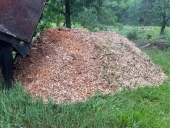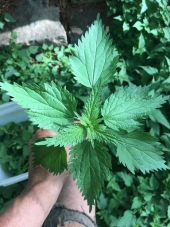Time to do a little laundry. I don't have a normal washer/dryer so this is a regular exercise for me. I have a small collection of different washing options, including an old electric wringer washer but for this BB I just used a plunger and a 30 gallon can and an antique hand crank wringer. I tend to presoak my dirty farm clothes for a while, agitating with the plunger periodically. I then drain and wring the clothes, measure the greywater friendly detergent and do the actual wash cycle. Wring, then rinse cycle, then wring again. Really not the best to put clothes with buttons through the wringer, it does tend to break them sometimes. The denim jacket I just squeezed out by hand, no way that's going through the wringer. Up to little second story deck where the pulley style clothesline runs back to the barn. I use mostly clothes pegs I make myself from willow and scrap cans. Once dry I folded them back into the basket to take inside.
here's my dream "washing machine"










